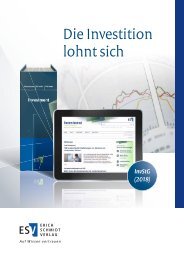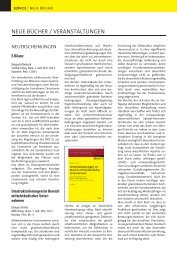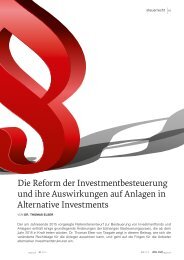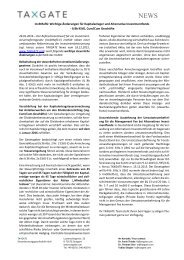Create successful ePaper yourself
Turn your PDF publications into a flip-book with our unique Google optimized e-Paper software.
THOUGHT LEADERSHIP EUROPE
N E T H E R L A N D S
game changer for EU Member States to further give up tax
sovereignty. In today’s global crisis, people do understand that a
change in the way we deal with the planet will be required, but I believe
that people are more likely to put their trust in institutions
close at home and will rely more on their own national governments
to take the necessary measures and to decide on the method
how to finance these measures than on international institutions.
The main challenge for the EU as a whole is whether Member States
that have a robust budget are willing to step in and help other
Member States.”
Q3: Loek, should sustainability be government-led, or should
this be a matter of corporate initiatives?
“Today’s crisis and the connect people tend to make with sustainability,
may lead to governments and organization as the EU and
OECD, taking the lead or an important coordinating role in these
matters. In my view 2020 could become a turning point in these developments.
However, this can’t be seen as a challenge to be only led
by governments or international organizations. Individuals, organizations
and corporates all will have to take their responsibility. And
this isn’t new. During the last decade we have seen many multinational
organizations changing the way they run their business with
a focus on sustainability. This will vary from the impact the company
makes on the environment, to the health and wellbeing of
people. In my view governments should stimulate these initiatives
and governments may use the tax instrument as it is currently already
used in multiple jurisdictions, provided the tax instrument is
used in a smart and effective way. This requires rules that are simple,
targeted and robust and not subject to abuse.”
“Multinational companies and tax policy”
Q4: Wilbert, which trends do you see in corporate
sustainability and tax?
“One simple trend is that companies approach us or other consultancy
firms to provide support in this area. Ever since the OECD
launched the BEPS initiative in 2012 and the EU more or less simultaneously
launched its own anti-tax avoidance initiatives,
multinational companies have become more transparent in their
approach to tax. Tax has become part of the public relations policy
of many multinationals. A sustainable tax policy and tax risk management
have become an integral part of Corporate Social Responsibility.
Within KPMG we have established an experienced network
of professionals from across the globe to deliver industry leading
practices, research and trusted client solutions to address these sustainability
issues, including sustainability solutions in the field of
taxation.”
Q5: Loek, which guiding principles would you recommend to
companies willing to publish tax policy statements as part of
good corporate citizenship?
“Of course, it is important for companies to consider the overall picture,
the trends in the industry and the trends at peers, as well as the legislative
landscape. Obviously, some multinational companies may take a very
advanced approach and become leading edge and a frontrunner in this
field. This will also depend on the overall sustainability strategy of the
company. Once multinationals have become very advanced in terms of
sustainability goals for the company at large, it makes a lot of sense to
also consider transparency in the field of taxation.”
Q6: Wilbert, do you think that the tax transparency principles
published brings the tax function of multinational companies into
a potential conflict with creating shareholder value?
“I don’t think so. Over time maybe even the contrary. Being transparent
on your tax principles may provide a reputational benefit against your
peers, whereas being secretive about the group’s tax position may bring a
potential conflict with the creation of shareholder value for that matter.
Obviously before deciding on the publication of data under such
tax transparency principles, company management must consider its
impact. This does not apply to tax only of course, but also to the other
parts of the business. Business reputation plays an important role,
more than in the past. With today’s media attention and the overall
public debate around tax, of course companies want to make sure that
indeed they pay a fair share of tax, whatever the definition of “fair”.
Being transparent about your aggressive tax planning won’t help. For
that same reason we have seen companies taking the appropriate measures
and making changes in their tax position on elements of their
business structure, before the publication of their country by country
reports under BEPS 13. Of course there are various degrees in the approach
companies may take in publishing tax data under their tax
transparency principles. Most companies publish their tax principles
or tax policy, but so far only a few have decided to be very transparent
about the total tax contribution of the group for instance on a country
by country basis, but this may change over time. In December
2019 for instance the Global Reporting Initiative (an independent international
organization that helps businesses and other organizations
understand and communicate their sustainability impacts) launched a
new tax reporting standard that seeks to ensure multinationals are
much clearer about how much – and where – they pay their taxes.
This has received widespread international support, but of course we
now have to see to what extent companies will actually apply the standard.
Apart from this standard, it should be kept in mind that public
transparency/public country by country reporting may one day become
the compulsory minimum standard.”
TAX EXPERTGUIDES 45
















